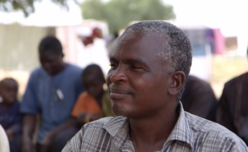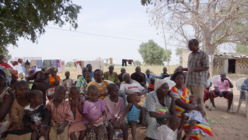“I was thinking that these people are going to come again. There is great fear in my mind.”
Beatrice first fled from his home in August 2014. He was a farmer from Madagali – a town in Adamawa state, one of the region’s worst hit by violent militants.

“They came to our town while I was working in my workshop at my milling machine. Because of the sound of its engine I couldn’t hear the bullets at first but then I saw people trying to run. A small child said to me: ‘Baba, run for your life.’ There was no way out but he said ‘come through the window.’ He showed me a way out through people’s houses.
“As I was running, bullets were gutting down guinea corn and maize before me. The fear made us climb the mountain to hide ourselves. My legs had swollen from running with bare feet. My brother took his motorcycle back into town to see what was happening. Immediately they shot him dead. It was so terrifying. I lost everything.”
Seeking safety
Almost 2 million people have been displaced by fighting in north-east Nigeria since 2013. The majority of displaced people in north-east Nigeria have been forced to flee multiple times as previously considered safe areas are raided. Over a year since he left his home, Beatrice and his family are now living in an informal settlement supported by the International Rescue Committee on the outskirts of Yola, accessed by a bridge which they hope will keep danger at bay.
“When I heard the bomb blast my mind drew back to when I was in my town. I lost everything I have. I didn’t take anything apart from the clothes on my body and my phone. I lost all of my animals. They took the goats and the sheep but they killed all of the pigs and left the bones in my house.”

Beatrice is a community leader in the camp which means he represents the displaced community and advocates for their needs to those who come to visit, support, or know more about their situation.
Working in north-east Nigeria since January 2014, the IRC has built latrines and emergency shelters in the camp which is home to approximately 250 people.
“They have done a lot for us,” says Beatrice “but if things can be settled, it is better to go home.”